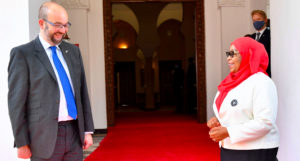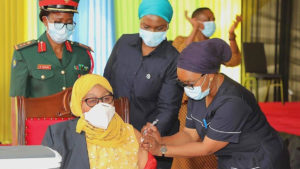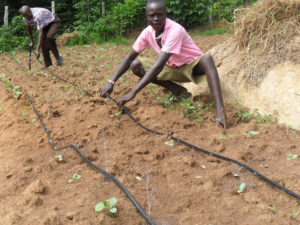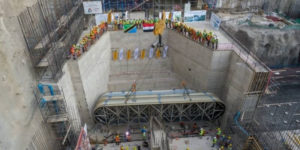by Ben Taylor
Among the many changes to Tanzania’s political landscape brought about by the change in top-level leadership, second only to Covid in prominence is perhaps the revival of debates about the country’s constitution. President Magufuli had made it clear that he had no intention of revisiting the topic, but perhaps President Samia Suluhu Hassan would see things differently. As a Zanzibari, she would certainly be expected to have a different perspective on the matter.
This was certainly the hope of both the two main opposition parties, ACT Wazalendo (with its weighty former-CUF contingent – see previous issues) and Chadema. Almost as soon as President Hassan was sworn into office, they began calling for a new constitution review process. The Chadema leader, Freeman Mbowe, publicly stated in May that his party would boycott the next general elections in 2025 unless a new constitution is in place.
“I have told Madam Samia that the constitution is not a personal issue but for the country and we will demand and fight for it with blood and sweat so that we get it before the General Election in 2025,” he said. It remains unclear what response she gave, but it certainly seemed to encourage the opposition parties that the change of President had opened a door to the possibility.
The most recent efforts to rewrite the country’s mother law had stalled in 2015, when time ran out on preparations for a referendum on a constitution drafted over the previous few years. President Kikwete’s second term of office came to an end in November of 2015, and President Magufuli saw no reason to move forward with what had become a very controversial matter, so the “proposed constitution” has never been put to a public vote. Nor was the “Warioba draft”, prepared by the Constitutional Review Commission under the leadership of former Prime Minister Joseph Warioba.
The two competing versions represent the controversy in the case. The Warioba draft proposed a substantive change to the relationship between Zanzibar and the rest of the country, with a “three government structure” comprising governments of Zanzibar, mainland Tanzania, and the United Republic. This was popular with the public on Zanzibar, including many CCM members and supporters, and with all the main opposition parties. Under President Kikwete’s guidance, however, this version was substantially edited late in the process by members of the CCM-dominated Constituent Assembly. The redrafting replaced the three government structure with something much more similar to the current two-government arrangements, motivated by concerns that the three-government approach was a ruse to split the union. It was this edited version that was set to be put to a public referendum in 2015, with results that looked set to be too close to predict.
The relationship between Zanzibar and mainland Tanzania is not the only issue prompting opposition parties to call for change. Chadema and ACT Wazalendo would each like to see changes that trim the powers of the Presidency, provide a strong and independent foundation for key bodies such as the National Electoral Commission and the judiciary, and strengthen protections for freedom of expression, freedom of assembly and freedom of association.
Nevertheless, the two competing visions for the country’s future governance, as represented by the two draft constitutions, present a serious sticking point for restarting discussions: which version should be brought back to the table? Positions on the two drafts have been deeply entrenched, and finding a way forward that allows all parties to sit together and consolidate them will not be easy.
“The President should own the process and pick a team of experts who will harmonize issues from the Second Draft Constitution and those in the Proposed Constitution,” according to Deus Kibamba of the Tanzania Constitution Forum, a civil society group.
Nor will it be easy to reach agreement that such a process should even be attempted. CCM secretary of Ideology and Publicity Shaka Hamdu Shaka, said in June that constitutional matters were not the party’s priority, that instead the ruling party was focused on national development.
President Samia Suluhu Hassan made her views on the matter known on June 28, arguing that the issue should wait so that she could have more time to guide the country to a full economic recovery from the Coronavirus pandemic. She used the term “chokochoko” (provocations) to describe the calls.
Warioba had thoughts on this: “The President has asked to be given more time, it is true, I agree, but until when? I think it is upon leaders themselves to agree on when the process of a new constitution should continue.” He suggested a referendum could be held concurrently with local government elections scheduled for late 2024.
“My advice is that these leaders should meet not to confront one another, but to have discussions on the problems facing the country: on how we deal with the Coronavirus, on a new constitution, on how we can boost our economy,” he suggested.





